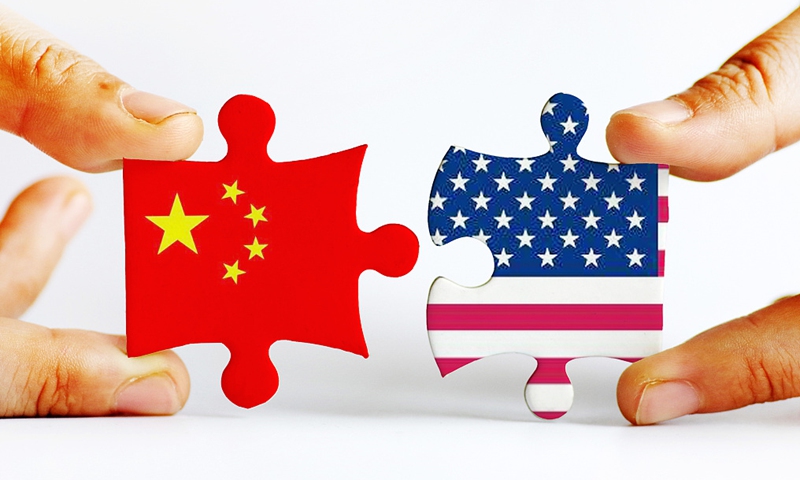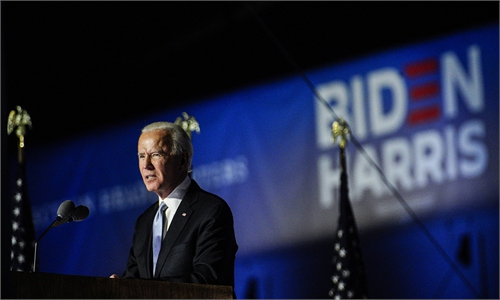WORLD / CHINA-US
Biden may lower chance of military conflict with China but containment strategy unlikely to change: expert

Photo: VCG
After Democratic nominee Joe Biden was elected 46th president of the US on Saturday, some observers wondered whether there will be less likelihood of military conflict with China, than under the Trump administration.
Some Chinese experts believed that US strategy of containing China won't change after Biden enters the White House, but he may adjust containment measures even while offering to better communicate with China.
Biden's policies will be based on the reality of the Trump administration and resemble those under the Obama administration to some extent, which, however, depends on congress and party politics, a military expert who asked to remain anonymous told the Global Times.
Compared to Trump's direct style, Biden will be more moderate. In the military sector, Trump ad always been aggressive and trying to "show some muscles," the expert said.
It's expected that such an aggressive stance under the Biden administration will be toned down, but he will join more allies to further isolate China, the expert noted. By advocating his values, Biden may also highlight China's "incompatibility," putting pressure on its system and emphasizing its weakness, the expert said.
The expert cited the South China Sea issue as an example. The outside world has been concerned that the possibility of a small-scale conflict between China and the US in the South China Sea has increased, and if it were not controlled, it would lead to disastrous consequences.
This judgment was furthered solidified when two US aircraft carriers entered the South China Sea and continuously conducted large-scale military exercises. At the same time, close-in reconnaissance of China by US ships and aircraft became more intense than ever.
The experts said that the US' so-called "freedom of navigation" in the South China Sea and its close-up reconnaissance trend will continue but be less frequent.
"After Biden takes office, it remains unclear whether the US actions will maintain a high intensity in the region, but there will be some new characteristics, such as pulling more countries together to support so-called "freedom of navigation" and collectively put pressure on China," the expert noted.
The expert also believes that while the Trump administration relied on military exercises to pressure China over the South China Sea, the Biden presidency may reduce their frequency.
The US may use "legal battles" to weaken legal support for China's South China Sea claims. Such change will decrease the instant pressure on China, but in the long run will make the South China Sea issue more complicated.
Just a week before the US election, US Department of Defense communicated with China and is likely to have more communication and cooperation to ease tensions and avoid conflict.
Chinese Defense Ministry spokesperson Wu Qian said at a monthly press conference on October 29 that the militaries of China and the US were currently holding a virtual meeting on crisis communication, and more exchanges and consultations on issues including maritime military security will be held by year's end.
The first meeting on crisis communication provided an opportunity for mutual understanding between the US and China on the prevention and management of crises and reduction of military risks. Both sides agreed that it is very important to establish timely communication mechanisms, and it is necessary to maintain regular communication channels in preventing crisis and carry out post-crisis assessments.
The two militaries held a virtual meeting on crisis communication from October 28 to 29 and both sides agreed to conduct a military personnel humanitarian relief and disaster reduction seminar and exchange, via video conference in mid-November.
It's very unlikely Biden will make any changes to crisis communication, as China-US military relationship is an important part of the bilateral relationship, the expert said. Maintaining a stable military relationship is in line with interests of the two countries, especially when military-to-military communication is not affected by the change in presidency, according to the expert.
"The overall characteristic of the Trump era is simple and straightforward. But Biden won't do that. No matter how it will play out, the mechanism will continue, so China and US militaries will have more communication channels," the expert said.
US media reported that Biden could nominate a woman to head the Defense department and Michele Flournoy, a former undersecretary of Defense for policy, is already the frontrunner to lead the Pentagon, according to Politico. As a China hawk, she has called for a strengthening of American military capabilities and the deepening of ties with US allies in Asia, according to the Guardian.
If she leads the Defense department, she would be more faithful to Biden's concept of aiming at China's "weakness," the expert noted.
The possibility can't be ruled out that the US will attack the edges of China. For example, if the US identifies China's submarine strength as a "weakness," it will increase its submarine activities accordingly.
It will take time to see how the military relationship between the two countries evolves, the expert noted. However, amid geopolitical rivalry, it is important to maintain a stable relationship in spite of divergences and maintain communication and cooperation.

